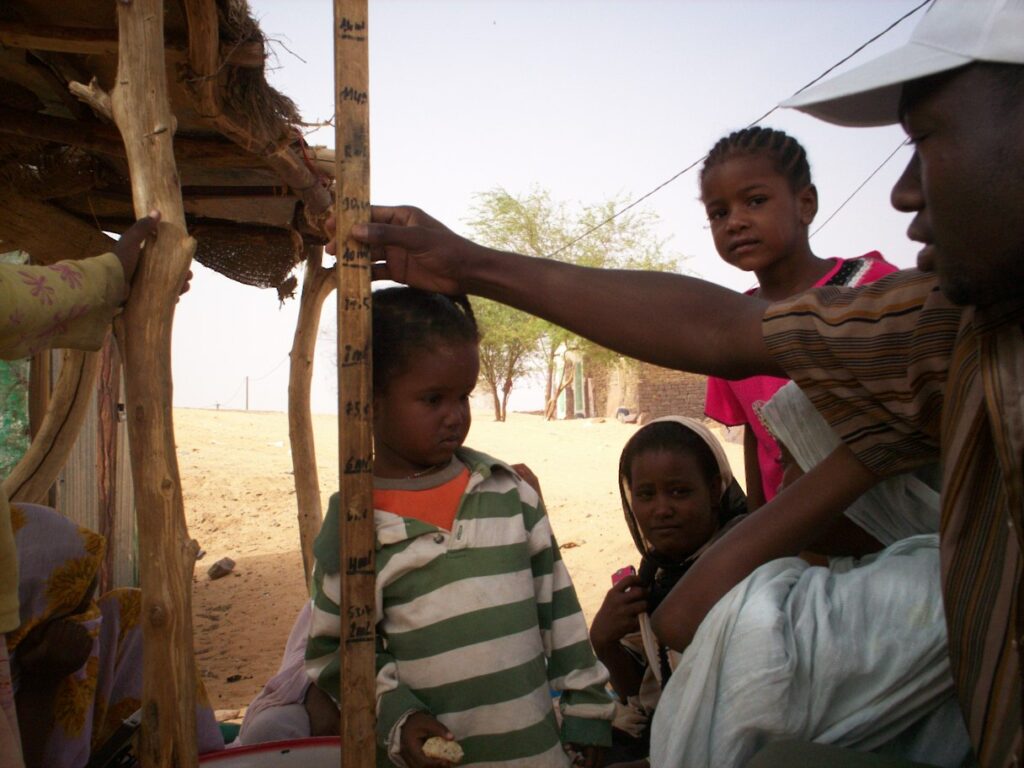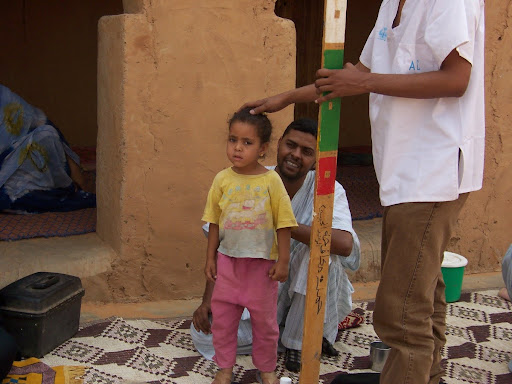Mauritania did the work to eliminate trachoma, and then came the paperwork
By Kelly Zongo and Kimberly Kamara

Image credit: Mauritania Ministry of Health
In 2000, nearly 19% of children in Mauritania were infected with trachoma before the age of one, but after years of dedicated effort, the country was on the verge of elimination. Then came the complex task of documentation that nearly derailed the global recognition of this historic accomplishment.
Mauritania’s program to eliminate trachoma- a painful and preventable eye disease that can lead to irreversible blindness- required years of coordinated interventions, from mass drug administration and water and sanitation improvements to surgeries for trichiasis (the blinding stage of trachoma). These efforts must be sustained until the disease no longer meets the criteria for being a public health threat.
At this point, countries begin the process of applying for official validation of elimination. This status is granted by the World Health Organization (WHO) after a rigorous process of measurement, evaluation, and reporting. Achieving validation means that a country is recognized by the world for its achievement.
But it’s more than just recognition—it’s a signal of national leadership, accountability, and resilience. Validation allows countries to responsibly re-allocate resources to meet other health demands, while ensuring strong surveillance systems are in place to prevent the disease from returning. Without formal validation, hard-won gains risk being overlooked or reversed, and opportunities for sustained investment and global recognition may be lost. The WHO officially validated Mauritania for eliminating trachoma as a public health problem on May 19th, 2025.
“This is another example of the incredible progress we have made against neglected tropical diseases and gives hope to many other nations still fighting against trachoma that they too can eliminate this disease,” said Dr. Tedros Adhanom Ghebreyesus, the WHO Director-General.
Since 2004, Mauritania’s national trachoma elimination program has provided more than 2.75 million drug treatments generously donated by Pfizer and over 1,350 vision-preserving surgeries carried out by the Ministry of Health for people with advanced trachoma. The Government of Mauritania also invested in environmental improvements to increase access to safe water and sanitation in areas where the disease was widespread.
But, as a testament to a maturing model of catalytic philanthropic capital to initiate the collaboration and initial needed funding, the majority of Mauritania’s mass drug administration campaigns and trachoma surgeries were not funded by international donors—they were supported by the government of Mauritania and the General Bank of Mauritania through the Bouamatou Foundation. This kind of local leadership accelerated Mauritania’s progress against trachoma—it also ensures sustainability long after the headlines fade.
From data to dossier
After years of sustained success, Mauritania’s next step was collecting data to demonstrate the impact on trachoma prevalence. The END Fund financed multiple trachoma surveys from 2019 to 2021 that demonstrated Mauritania had reached the epidemiological thresholds needed for validation. These results formed the backbone of what is known as the WHO’s elimination dossier.
The rigor required to successfully prepare the dossier is often underestimated. The WHO requires a robust, comprehensive, and verifiable account of the data and interventions used to reach elimination targets. Every number, chart, and section must align with WHO’s rigorous standards. It’s not just about what was done; it’s about how clearly and credibly a country can prove it.
That is why WHO validation is critical in telling the world that both their health outcomes and their documentation have passed one of the most meticulous vetting processes in global health.
After a long and iterative process, the dossier still hadn’t conveyed the elimination data sufficiently enough. It was not telling Mauritania’s success story clearly.
This is where the END Fund stepped in with an investment to contract an expert, Dr. Sidi Coulibaly, and the Organisation pour la Prévention de la Cécité (OPC) to work with the Mauritanian Ministry of Health to rework the dossier to meet the required standards. For less than $8,000, the dossier was correctly formatted and accepted making Mauritania the 22nd country to reach official elimination of trachoma.

The END fund leveraged unrestricted investments from Mackenzie Scott and the Legatum Foundation to provide this nimble support to help Mauritania reach elimination of trachoma.
Dr. Abdallahi Ould Minnih is the Eye Health Coordinator of the Blindness Program within the Ministry of Health of Mauritania. He worked closely with Dr. Coulibaly on the dossier preparation and described their partnership in glowing terms.
“I was pessimistic that Mauritania could complete the dossier successfully because we did not have the skills. Fortunately, Dr. Coulibaly was there to support us. I pay tribute to him, and today we consider him an honorary citizen of Mauritania.”
“Neglect no data”
“The advice I would give to other countries is to start preparing the ground for the dossier as soon as possible,” said Dr. Minnih. “Study the WHO requirements, and look at the dossiers of countries that have already been validated as examples.”
He also noted the importance of finding the right people for the task. “Countries should ask their Ministry of Health to put in place a multi-skilled team that includes people who can develop the necessary maps, tables, and files for the dossier. This is not only a job for doctors or health experts. A whole team needs to be prepared for this.”
“Having a team or committee is the ideal,” confirmed Dr. Coulibaly. “It should be multisectoral, and everyone has a role to play.”
“My other piece of advice is to neglect no data,” said Dr. Minnih. Dr. Coulibaly explained, “The elimination file must start with the first trachoma control activities, and compile them into a history.” It is essential to collect and analyze all data related to the elimination program from start to finish to demonstrate reduction in prevalence, and include the most useful data in the dossier to tell the elimination story effectively.
Dr. Minnih also emphasized the role of multi-sectoral collaboration to collect data. The elimination dossier must thoroughly describe conditions in a country related to water, sanitation, and hygiene (WASH) coverage, and efforts to integrate improvements with disease elimination programs to sustain elimination. Mauritania’s Ministry of Health relied on other key ministries to integrate crucial data on WASH coverage into the dossier.
What comes next
Dr. Minnih emphasized that the work of the trachoma elimination program is far from over. “We cannot rest on our laurels, or everything we have already achieved will fall apart.” Mauritania now enters the post-elimination surveillance phase in which it will monitor and respond to signals that the threat of trachoma is re-emerging, and a workshop is planned to kick off these efforts. “Now is the time to begin consolidating our achievements through epidemiological surveillance, training of health center staff, awareness-raising, and health education. This work is only just beginning.”
Dr. Minnih noted that the sustained political commitment required to achieve elimination could not be overstated. “Ultimately, it was the will of this country that eliminated trachoma. The Mauritanian government played a leading role in achieving these results.”
Mauritania’s journey reminds us that when a country reaches that final step, validation of elimination is more than a rubber stamp. It is a recognition of the resilience, willpower, and commitment that is needed to achieve this feat.



